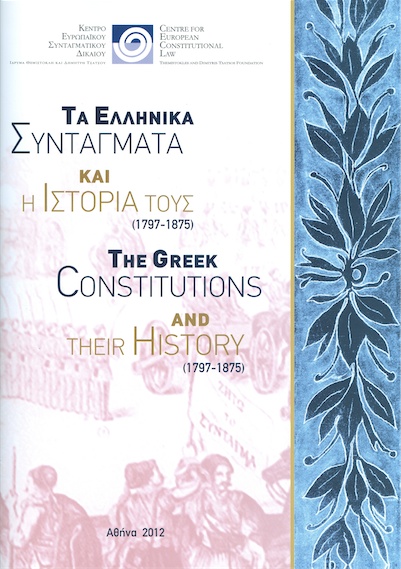 Editor: Maria Mousmouti, The Greek Constitutions and their History (1797-1875), Centre for European Constitutional Law, Athens 2012
Editor: Maria Mousmouti, The Greek Constitutions and their History (1797-1875), Centre for European Constitutional Law, Athens 2012
The study of the evolution of political and constitutional institutions is central to the understanding and the self-knowledge of the Greek polity. The examination of constitutional texts and their historical surroundings is not only interesting from an academic perspective, but also performs an important ideological and educational function, as a way of promoting societal self-awareness. In that sense, ita can become a valuable guide for the development of a constitutional patriotism which could motivate citizens to achieve collective goals.
Constitutional texts acquire increased symbolic power through their visual and aesthetic dimensions. The aesthetication of constitutional texts is an independent aspect of their prestige and value which broadens the perception and understanding of the texts and the related historical events. The origality of the present volume lies particularly in the fact that it emphasises the aesthetic dimension of important documents of recent Greek constitutional history. This approach is coupled by dense and concise information presented in such a way as to make it accessible to every reader. At the same time, in this extremely critical period for the country, when values, institutions and the overall political organisation of social co-existence are questioned, returning to the roots of Greek constitutionalism is an act with a clear political message and content.
The choise of period covered by this volume is not random. The volume starts with pre-revolutionary constitutional texts and the constitutions of the war of independence, known primarily for their democratic character, and ends with the Constitution of 1864 and the principle of ‘declared’ confidence of Parliament, in other words, with a historical period during which the constitutional state was consolidated and the fundamental features that would firther shape all future Greek Constitutions were formed. The Constitutio of 1864 introduced a parliamentary tradition which remains powerful, despite being repeatedly questioned by its opponents in the course of the 20th century. This tradition is a valuable asset in the current questioning of the political system.

